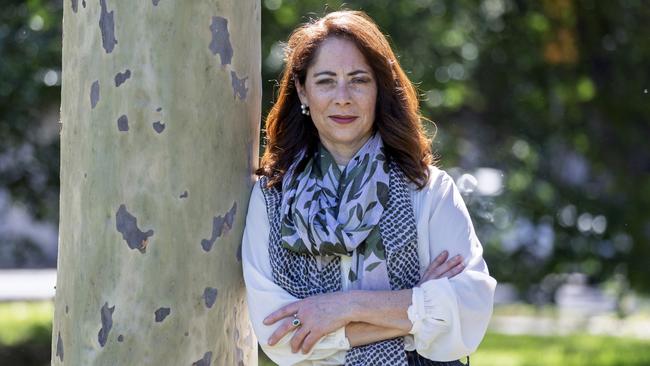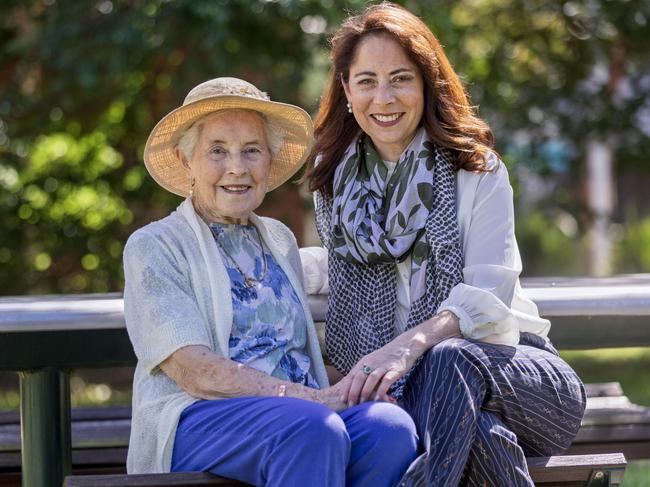Perimenopause shook Katherine’s confidence. Now she’s taking menopause to the boardroom
She’s smart and successful, but perimenopause left Katherine Milesi rattled. Then the former Deloitte executive realised corporate Australia was in need of a strategic plan.

During her time as a senior partner and board member at Deloitte, Katherine Milesi was used to high-pressure situations and commanding attention in the boardroom. Then, when she was around 46, something changed and she was filled with a level of anxiety and self-doubt that she had never experienced before.
“I had an increase in performance anxiety in terms of public speaking and even standing in front of my team. I felt I’d mastered that, but then I thought I was regressing.” She wasn’t regressing, at least, not in a typical sense. What she was experiencing was undiagnosed perimenopause symptoms that were varied and lasted for years.
“I didn’t have the typical hot flushes or night sweats, and so I had other things like sleep disturbance, concentration, energy and fatigue loss, tinnitus, I had weight gain, I had digestive problems and I had tingling feet.”
Those symptoms didn’t all hit at once, so it made it difficult to identify a pattern and treat them. It’s only in hindsight that she has attributed them to perimenopause. When Milesi went through menopause at 51, it helped her to understand more about how she had been feeling and why.
She also developed strategies to cope with things such as brain fog that would cause her to lose her train of thought mid-presentation. “I did keep progressing and I was performing; it just got harder, that’s all. But I would be in a board meeting and I would just lose my train of thought, you know, just lose the next word. So I taught myself how to do bridging statements, so if this happened I would then make a bridging statement and then I would go to the next topic.”
After more than 30 years with the company, Milesi retired as a partner when she was 56 and transitioned into a contracted advisory role for it and other businesses.
In that time between roles came a moment that would reshape the next phase of her life. She was on a family holiday at Noosa when something suddenly dawned on her. “I thought, “My goodness, we have been focused for so long on gender equity in all its forms, and particularly where I was working in having women mentored and promoted into senior roles and be thriving and successful at the very top of the organisation, and we missed a connection point, and that connection point was the impact of perimenopause on women’s confidence at a time when they are being considered for senior roles.”
It was such a significant moment, she resolved to return to Deloitte and confront the issue and start using “the M-word”, as she puts it, so that hers would be the last generation where menopause and its potential symptoms came as a shock.

Within two years, Deloitte Australia went from zero conversations about it to openly discussing menopause, offering educational resources on the intranet, Q&A sessions were held and attended by the most senior levels of leadership along with medical professionals, and support sessions were held so women could share their experiences of perimenopause and menopause and, crucially, talk about coping strategies.
Men also played an integral part and were brought into conversations. “That was extremely important so that when groups of people were talking, men felt that they could ask a question or maybe make a comment about the fact that they were experiencing this in their personal life with their partner or mother or sister or whatever,” Milesi says.
Deloitte Australia’s chief people and purpose officer Pip Dexter says the organisation now recognises the potential disruption menopause can cause its workers and has become more accommodating. “We want to make sure that we are providing as much support as possible. We also know this is an important way to drive inclusion and equity, break gender norms and support our people to be at their best through all life stages.”
What has been happening at Deloitte is part of a much wider movement to make workplaces more considerate and supportive of women’s health needs.
This year, a Senate inquiry into issues related to menopause and perimenopause heard from women who were worried about the impact of menopause on their career.
One woman wrote in a submission: “I fear for my future career as I may need to reduce my work to part time to cope or wonder if I may need to consider leaving the workforce earlier than planned. This has stopped me putting my hand up for career progression opportunities because I fear that I could not cope with the extra responsibilities and pressure while enduring the current physical symptoms.”
Milesi also helped to write a submission for the organisation Chief Executive Women, which called on the government to boost investment into women’s health research – especially perimenopause and menopause, saying keeping women in the workforce for longer would be, among other things, economically beneficial.
The group also used its submission to call on business leaders to better support women’s health and workplace participation, particularly during leadership years, and for a boost to health literacy for all employees and levels of management.
The Senate inquiry concluded in September and made 25 recommendations, including for women to be offered flexible working arrangements during menopause, for workplaces to develop menopause policies with their employees and for research to be conducted into the prospect of additional menopause leave. However, that last one is a concept that also has some critics who fear such a move could deter employers from hiring midlife women and fuel workplace age discrimination.
Part of the driver of all of this is societal. Women typically are staying in the workforce for longer and more are ending up in senior leadership roles. That’s prompting conversations and recognition that small adjustments could have a big impact – even something as simple as offering desktop fans can help.
It’s progress Milesi is encouraged by because she doesn’t want women to be afraid of speaking up and seeking support when they need it.
“And really it’s a mindset. So it’s not thinking that this is going to be a derailer or this is going to be hard or tough. If you can recognise from the outset that this is a normal phase … and this is an opportunity to look at my health, my mental and physical health, in all its aspects, and get the support I need. So really look at it as a strategic plan for the next phase of your health journey.”





To join the conversation, please log in. Don't have an account? Register
Join the conversation, you are commenting as Logout